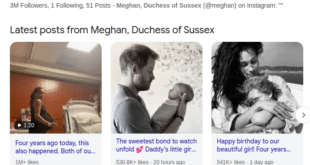Viral Controversy: Lilly Gaddis’ Use of the N-Word
Lilly Gaddis, a young white woman, recently went viral after using the n-word in a TikTok video, sparking widespread outrage and garnering millions of views. This backlash led to her termination from her job and set her on a path to become a conservative influencer. This article explores the incident, its repercussions, and the broader implications.
Read more: OMG! Meghan Markle was a YACHT GIRL?!?!?!
The Incident and Immediate Backlash
Lilly Gaddis posted a TikTok video that quickly sparked massive outrage. In the video, she used the n-word while making derogatory comments about married people. The video rapidly spread across various social media platforms, amassing millions of views and eliciting strong reactions from viewers.
Here is an excerpt from the controversial video: “Everybody I know who’s married right now, they’re married to Broke Ass N*****, and they don’t care. We don’t give a **** about your money. I couldn’t care less about your money.”
Lilly’s use of the n-word, regardless of context, led to a torrent of criticism, with people labeling her as racist and calling for accountability. The uproar extended beyond social media, with many viewers contacting her employer to report her offensive behavior.
The Employer’s Response
In response to the controversy, Lilly’s employer, Roie of the Carolinas, swiftly terminated her employment. The company released a statement addressing the situation: “We at Rophe of the Carolinas want to address a recent incident that has caused concern and upset amongst our stakeholders. A newly hired employee made inflammatory remarks on social media that do not align with the values and beliefs of our company. We want to make it clear that these sentiments are not representative of our organization, and we do not condone or support such behavior. As soon as we were made aware of the situation, we took immediate action to pull the employee from her assignment, and the employee in question is no longer with our company. We are committed to fostering a diverse, inclusive, and respectful work environment where all individuals are valued and respected.”
Lilly’s Response: Doubling Down
Instead of issuing an apology, Lilly chose to double down on her stance. In a follow-up video, she stated: “A recent video of mine seems to have upset members of a certain community. All the backlash made me do a deep dive, like a soul search, and after all that, I still couldn’t find a care.”
This unapologetic response further inflamed public sentiment. Lilly continued to produce provocative content, explicitly targeting the black community and criticizing those who took offense to her language.
The Debate on the N-Word
The incident reignited debates surrounding the use of the n-word. Opinions on this issue are deeply divided. Some argue that no one should use the word due to its historical and racist connotations, while others believe that language can be reclaimed and redefined by marginalized communities.
Lilly’s use of the n-word in a non-racist context did not diminish the word’s offensive impact. Many people of various backgrounds were outraged, not just the black community. This incident highlights the enduring sensitivity and power of racial slurs, regardless of the speaker’s intentions or context.
Rage Baiting and Its Consequences
Lilly’s actions appear to be a deliberate attempt at “rage baiting” – creating content designed to provoke outrage and gain attention. This tactic is increasingly common in the digital age, where controversy can drive viewership and online engagement.
Lilly’s subsequent behavior, including inflammatory tweets and more provocative videos, underscores her strategy of capitalizing on outrage. For instance, she tweeted: “Thanks black community for helping to launch my new career in conservative media. You all played your role well like the puppets you are.”
This antagonistic rhetoric only served to further alienate and anger many people. While she gained notoriety, her actions have also drawn criticism from various quarters, including those within the conservative community who disapprove of her methods and message.
The Role of Social Media and Public Reaction
The public’s reaction played a significant role in this incident. The rapid spread of the video and the collective outrage it generated highlight the power of social media in shaping narratives and driving consequences for online behavior. This phenomenon raises questions about the efficacy and ethics of “cancel culture” and its impact on individuals and society.
This is a cautionary tale
Lilly Gaddis’s case is a cautionary tale about the consequences of using inflammatory language and engaging in rage baiting. While she gained temporary attention and notoriety, the long-term implications for her reputation and career remain uncertain. The incident also underscores the need for a thoughtful and measured approach to handling offensive speech and highlights the complexities of reclaiming and redefining derogatory terms. As society continues to grapple with issues of free speech, accountability, and the power of words, this incident serves as a stark reminder of the impact that language can have in our interconnected world.
 Reply Girl Commentary on the news and other content
Reply Girl Commentary on the news and other content
